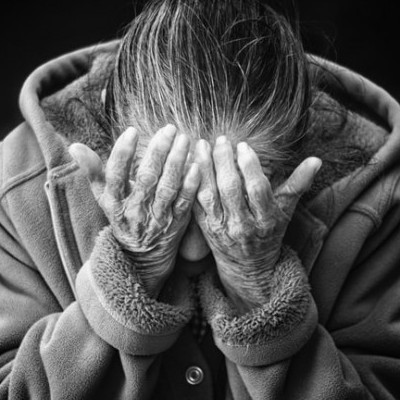Let’s look at how to stop feeling depressed about getting older and embrace the positives, as there are many, and sometimes you fail to notice the good side because you are so focused on the bad.
How To Stop Feeling Depressed About Getting Older
The National Institutes of Health say that depression is more than just sad feelings, rather it is a very real mood disorder. It can have a serious impact on how you live your daily life.
Depression can also impact how you sleep, perform tasks, interact with others, and essentially how you function in the world at large. (Read more about depression here).
Although depression is really common in older adults it is not actually a natural part of aging. Seniors, however, are at risk of developing depression due to the drastic life shifts that can occur in later life.
These can include retirement, illness, losing someone you love, and even boredom or feeling you have nothing left to live for. Some people can adjust eventually while others can fall prey to depression.
Why Do People Get Depressed When Getting Older?
As we grow older, we often face significant life changes that can increase the risk for depression. These can include things like illness and disability, health problems, chronic pain, cognitive decline, damage to your body image due to surgery, or sickness and these can all be contributors to depression.
There is evidence that some natural body changes associated with aging may increase a person’s risk of experiencing depression. Recent studies suggest that lower concentrations of folate in the blood and nervous system may contribute to depression, mental impairment, and dementia.
If you are suffering from true depression, it is always wise to get help. It is not clever to try and deal with depression on your own.
Here are some surprising statistics about depression:
“The percentage of adults who experienced any symptoms of depression was highest among those aged 18–29 (21.0%), followed by those aged 45–64 (18.4%) and 65 and over (18.4%), and lastly, by those aged 30–44 (16.8%). Women were more likely than men to experience mild, moderate, or severe symptoms of depression.”
If you are simply feeling the blues, this is very common, and here are some things that may help you see that many people are dealing with the same things that you are dealing with, and you can do something about it.
Dealing With Loss
Johns Hopkins who is a geriatric medicine physician Alicia Arbaje, M.D., M.P.H. says that the loss of a loved one in later life can bring us face to face with our own mortality. If these feelings of loss and fear are not addressed, they can draw us down into a deep depression.
As we age the reality of death becomes more prominent in our lives, but it should never become our sole focus.
There is never any shame in reaching out for help when we suffer a major loss. If we allow ourselves to shut down and dwell on what we have lost, we may never fully pull ourselves back up again. Seek help from experts if you find yourself unable to cope. Remember that you are still here, and you have more life to live, so you need to make the most of it.
Stay Positive About Your Health
Aging, unfortunately, brings health concerns and forces us to pay closer attention to our bodies. This can bring us down emotionally, but only if we allow it. We must remember though that we still have control of what we eat and what we do to stay healthy.
Making the right health choices becomes more important but while we still have a choice, we still have control.
Losing Your Looks
Although this should be the least of your worries, it is interesting to note that stress can make you look much older than your real age, and it can lead to pimples, pigmentation, and hair loss. No matter what lotions and potions you put on your skin, if you are stressed and worried, it is going to show on your face.
Did you know that stress is a major contributor to premature aging and skin pigmentation?
Eat healthily, make time for yourself, practice mindfulness or meditation, whatever it takes to train yourself to relax more. Watch what you eat and increase your water intake, as this area is very often ignored when you are stressed and busy.
Regular physical exercise boosts both your energy and your mood, and it reinforces your power to take charge of your own health and well-being. Exercise can make you look healthier and give you a certain glow you can’t get out of a bottle.
Dealing With An Empty Nest
 Raising children takes a large chunk of your adult life and your children become a major part of who you are.
Raising children takes a large chunk of your adult life and your children become a major part of who you are.
Eventually, though they grow up and start their own adult lives. The once-busy house goes quiet and you feel less needed. This could not be further from the truth, you still have plenty to offer.
Focus on the fact that you successfully raised your children to be capable adults. Remember one day they may have children of their own and will likely come to you for advice. You get to be a grandparent – all the fun of having kids without all the hard, exhausting parts.
New Beginnings
Leaving the past behind may seem terrifying especially because you are letting go of the familiar. It could be the kids leaving home, entering retirement or losing a spouse. These are major changes and can feel like the end of the world. The truth is we are still here, and life continues and now there are new things on the horizon.
Once we move beyond our losses and reach the point where we need to plan to carry on, we may find exciting things to look forward to. There may be scope to travel and experience new things or maybe find new exciting roles in life.
Embracing the future does not discredit the past, we are allowed to move on and have optimism for our future.
Final Thoughts
There are always going to be challenges when it comes to aging, and you need to focus on how to stop feeling depressed about getting older. Like in all aspects of life, many of them are daunting but this does not give us an excuse to give up. There are positives to getting older that can outweigh the negatives, all we have to do is embrace our maturity and our new roles.


